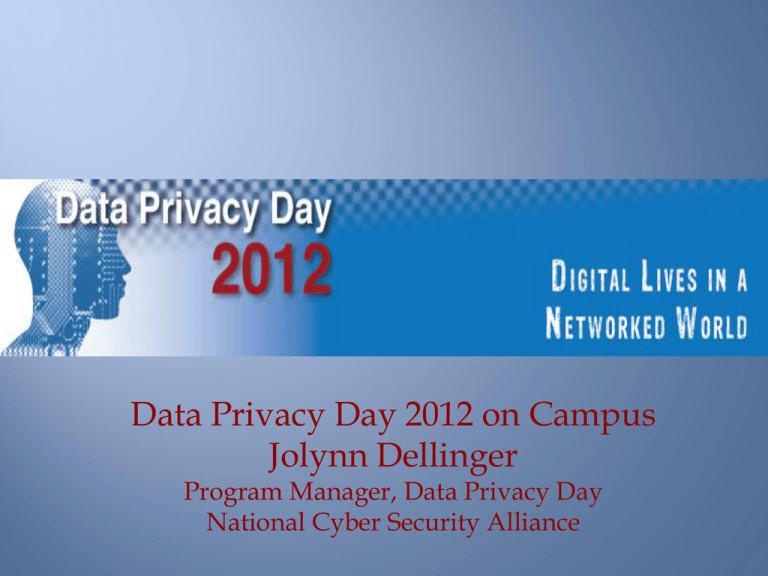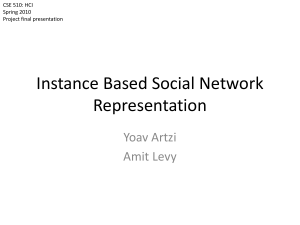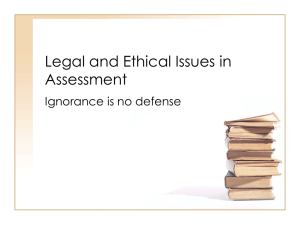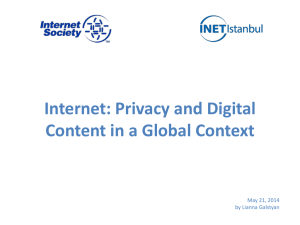Raise Awareness about Privacy among Students
advertisement

Data Privacy Day 2012 on Campus Jolynn Dellinger Program Manager, Data Privacy Day National Cyber Security Alliance Data Privacy Day – What are the goals? Promoting an Understanding of Privacy and Personal Data in a Digital World Educational Outreach Fostering International Collaboration around Privacy and Data Protection Issues 2007 – 2012 Data Privacy Day has been celebrated in the US, Canada and the Council of Europe countries. Every year new countries join the celebration. DPD began with Intel, moved to The Privacy Projects, and is now being managed by the National Cyber Security Alliance DPD offers opportunities to: • focus global attention on privacy • highlight the global nature of the issue and the need to collaborate and cooperate internationally around privacy issues • encourage corporate privacy accountability • bring attention to the role of government in protecting privacy and an understanding of proposed legislation pertaining to privacy • help individuals learn about the ways technologies place their personal data at risk and best practices to protect their personal information How do we accomplish these goals? • Events, Initiatives, Trainings, Media • Educational Outreach – resources provided year round on the webpage • Involving diverse stakeholders: industry, government, academics, educators and students, nonprofits Educational Outreach Target Audiences • Consumers • Businesses • Parents & Kids • Teens & Young Adults Privacy Issues • Social media and social networking • Mobile devices • Location based services • Digital citizenship • Reputation management • Health privacy • Smart grid • Behavioral targeting and advertising • Identity theft Collecting and Bringing Attention to Educational Resources Events and Initiatives in the United States, Canada, UK and Ireland • Intel, Comcast and NCSA are hosting an event discussing the intersection of privacy and security at the George Washington University Law School in Washington, D.C. on January 26 • Microsoft is hosting an event at the Churchill Club in San Jose, California to discuss “The Collection of Online Consumer Data: The Good, The Bad and the Unknown” on January 24 • Ontario’s Information and Privacy Officer Dr. Ann Cavoukian is hosting “Beware of ‘Surveillance by Design’: The Threat of Looming ‘Lawful Access’ Litigation” on Friday January 27 at MaRS Discovery District in Toronto, Ontario • Internal corporate initiatives and trainings •The I in online educational initiative in UK, Ireland and US http://www.theiinonline.org/2010/11/on-data-protection-day-28-january-2011-thei-in-online-will-have-lawyers-across-the-uk-ireland-and-canada-presenting-tochildren/ Communicate with Each Other and with Data Privacy Day Become a Champion of Data Privacy Day. If you are participating, send your logo and link to me at jolynn@staysafeonline.org Become a fan of the Data Privacy: NCSA Facebook page (http://www.facebook.com/DataPrivacyNCSA) and follow Data Privacy Day on Twitter at @DataPrivacyDay. Communicate with College/University Employees Raise Awareness about Privacy among Students Communicate with Students: Outreach to Teens and Young Adults – A Data Privacy Day Tradition Initiate a privacy awareness campaign on your campus in January as students return to school. Post the Data Privacy Day logo as well as tip sheets, posters and banners around campus and on your school’s webpage. Invite a guest lecturer to campus to discuss privacy, online reputation management or digital citizenship. Make EDUCAUSE’s webinar featuring Matt Ivester available to your students in late January. Let your students know about privacy resources : Understanding Mobile Apps at http://onguardonline.gov/articles/0018understanding-mobile-apps; Safety Web’s Online Reputation Guide for College Students at http://www.safetyweb.com/online-reputation-guide-for-college-students; and Data Privacy Day’s resources for teens and young adults at www.dataprivacyday.org . Every student will improve his or her privacy knowledge by reading this book Help students understand digital concepts that affect their online footprints: permanence, access, lack of control over content, replicability, speed and pervasiveness Focus is not how to use the technology but how to use it responsibly and in a way that protects the student’s privacy Write an article offering privacy and online safety tips and advice for your campus newspaper. You can use information found at http://www.staysafeonline.org/dpd. Blog about privacy throughout the month. Use Facebook and Twitter to disseminate information and encourage students, faculty and staff to learn more about protecting their privacy. Feel free to use content found at http://www.staysafeonline.org/dpd. Include the STOP. THINK. CONNECT. tips and advice (http://www.staysafeonline.org/tools-resources/stop-thinkconnect) in student handbooks and orientation materials. Raise Awareness about Privacy among Students : The Job Interview Over 75% of employers surveyed by Microsoft for a Data Privacy Day study considered online information when making hiring decisions. 70% of those employers acknowledged having rejected job candidates based on information they found online. Make sure your career counseling offices are prepared to counsel students about online reputation management. When? Events and Initiatives will be taking place throughout January and into the beginning days of February. Where? On your campus. Who? Pick an audience that works for you. Focus on students; staff; or community. Why? To promote awareness, education, and critical thinking about the importance of protecting the privacy of personal information online. Thoughts? Plans? Requests? Thank you! Contact me at jolynn@staysafeonline.org for more information.







